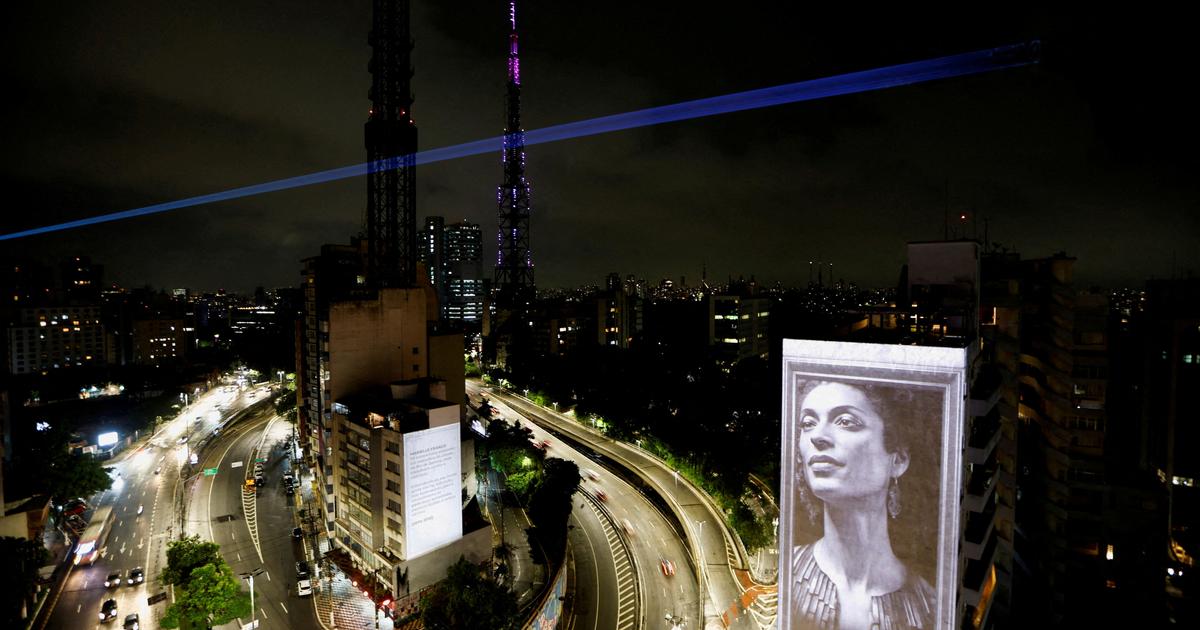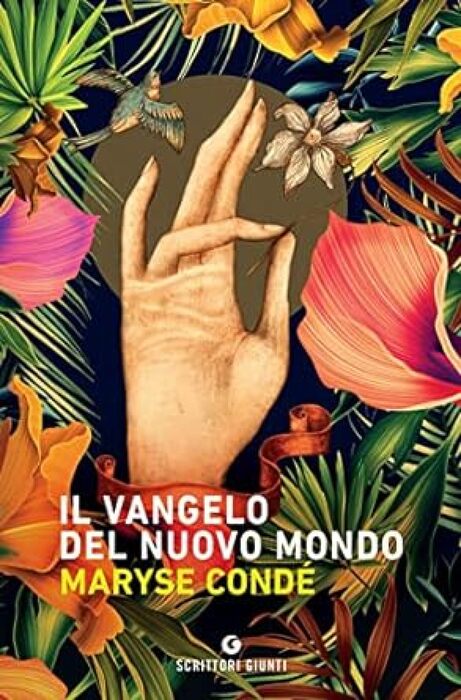Enlarge image
The crypto artist Gean Guilherme Santos Lopes with virtual reality glasses in the favela St. Amaro in Rio de Janeiro
Photo: Kristin Bethge
In the perfect world, Luiz Augusto is a police officer.
A hero who only does good.
The character he created is called Bigodinho, »Mustache«, in the computer game Grand Theft Auto he lives in the virtual city of Los Santos, hunts criminals and donates food to the needy.
Bigodinho is something like Augusto's alter ego, also optically, for the Afro hair Augusto paid 300 reals, real money.
That was important to him.
Augusto, 24, enters his perfect world from a dusty office chair.
Inside his hut with a corrugated iron roof there is an old sofa, a refrigerator, a bed and a rusty fan, the protective grille of which Augusto has removed so that he can cool down better, but who still has no chance against the heat.
A lightbulb
dangles from the ceiling.
There is a six pack of energy drinks on the floor.
The view through the window falls on the river into which the Favela Vigario Geral discharges its sewage.
Augusto opens a laptop.
He enters the parallel reality that brings him out of the favela on the outskirts of Brazil's second largest city, Rio de Janeiro, out of poverty, away from the streets, from the drug dealers he used to hang out with.
Sometimes he sits here for ten hours, usually 14 or 15 a day.
As he plays, he records, moderates and chats with people all over the world.
For this he receives some money from the Trovo.live platform.
Augusto is a streamer, something of an influencer in the gaming scene.
He has around 850 followers, which is not a lot, but it is enough to stay afloat.
The technology industry turns over billions; Real money can be made with branches of business such as gaming, cryptocurrencies or the rights to digital art. But the virtual world is also one of the whites, one to which people from favelas have little access. But that is currently changing: Because social organizations have discovered the field, but also because individual pioneers have opened up this world, accelerated not least due to the isolation during the pandemic. These pioneers recognized virtuality as a space in which they can find recognition and make money, as a way to escape their harsh reality - and to change it at the same time.
The Favela Vigario Geral is a claustrophobic place, encircled between a river and a train route flanked by walls. If you drive in with a car, you first have to slalom around concrete blocks that serve as a road blockade. On one corner, young men from the drug industry stand guard, armed with machine guns and ammunition belts strapped around their bare chests.
A few streets down there is a multi-story building, in 2010 Afro Music moved here, a social enterprise that trained guitarists and drummers and sent rap bands around the world. But at some point the sponsors were missing. In 2017 Ricardo Chantilly came into play, a tanned music manager from Rio who was supposed to renovate the store. He traveled to Seattle where he attended a gaming competition. There were hardly any black players among the 15,000 participants. Neither do women. The prize money was $ 25 million. Chantilly felt that this was not the time to make music. "It's the hour of gaming." He founded Afro Games.
Chantilly leads through the building, showing a cooled-down room with rows of computers and monitors, in front of which are comfortable office chairs with red neck cushions. There are 20 so-called stations. "The equipment costs around 2400 euros per set," he says, "nobody in the favela can afford that." Afro Games is financed exclusively by private sponsors such as airlines, software companies and beverage manufacturers.
Afro Games started teaching in mid-2019. Since then, 100 students aged 13 and over, including 20 women and girls, have been learning either to program or to play games at their own request - plus English. From among the students practicing the League of Legends game, teachers and external experts ultimately selected the six greatest talents. Chantilly pays them the national minimum wage, around 170 euros per month. To do this, they can be trained to become professional gamers. The plan: They should soon take part in competitions and collect prize money, which they can then keep.
This morning, the “electronic athletes” complete analog fitness training in a hall under the roof to prevent tension - after all, they sit in front of the computer for hours every day. One of them is Gabriela Evellyn Ferreira, 20, a black-clad woman with curly hair who excelled in mathematics at school. She lives behind the so-called "border with Gaza", in other words in the warring neighboring favela. Until a few years ago, there was an armed drug war between two gangs here. Ferreira's way to school leads past walls and electricity pylons that are littered with bullet holes.
She speaks of "her work" when she talks about the game. And she loves this job. "I dive into this fantasy, and it is completely different from my reality," she says, "I feel needed and important." She came here through her boyfriend Gaming. In contrast to Ferreira, her boyfriend did not make it into the professional team. "I never thought that this could become my job," says Ferreira, "I make money with something that makes me happy." She wants to be a role model and encourage other girls.
Behind Ferreira is an organization that supports her in her career.
But there is also the reverse case: Young people from the favela set up a tech company themselves, conquer a domain from which they were previously largely excluded.
Like Gean Guilherme Santos Lopes, 21. He lives in another favela in Rio de Janeiro.
St. Amaro is located in the middle of the city on a hillside, a chaos of stairs, colorful houses and power cables.
Santos Lopes turns into a narrow, dark alley and unlocks a door.
"This is where I produce," he says.
For about five months he has been renting the tiled room for around 80 euros a month, his “studio”.
At home he had trouble concentrating with an extended family, a baby and a dog in a confined space.
Santos Lopes, dyed purple hair, white flip-flops, studies product design at the Catholic University of Rio de Janeiro.
He had access to a computer as a child because his father worked as a computer scientist in the Brazilian military;
that is his starting advantage.
He taught himself 3-D technology with the help of open source instructions from the Internet.
As a child, Santos Lopes was often unable to go to school because gangs and police shot each other outside.
They riddled the walls of the house where he lived with his family.
Motifs such as cartridges, machine guns and shattered windows keep cropping up in his digital art.
Everything is quiet right now, "but war could break out here at any moment," says Santos Lopes.
He turns on his computer and checks the rates of various crypto currencies. "Until recently, I had no idea about any of this," he says. He spent a lot of time at home because of the pandemic. At the beginning of the year he came across the term crypto-art. He researched. And could hardly believe what he was reading: Non Fungible Tokens, so-called NFTs, digital, protected and limited objects that can be sold for a lot of money. “I thought: Wow. This is my chance to get a piece of the cake, «he says.
He began programming digital works of art and offering them for sale as NFTs. At the same time he founded the organization Social Crypto Art because he also wanted to do something for his community, in which the need was growing during the corona crisis. He created an NFT called "Hungry," a rotating one-real coin with a bird on the back that is feeding its baby a worm. Santos Lopes gave the work for free in exchange for donations that he used to buy food and hygiene products for needy people in St. Amaro - and sweets for their children. With another digital 3-D painting called "Paul's Barracks" he helped rebuild the crumbling house of a 73-year-old favela resident.
But even the perfect world has its pitfalls.
In gaming, for example, the competition is fierce, tough competition.
Ricardo Chantilly from Afro Games knows that too.
"
Of course we could also offer theater courses here," he says, "but what will happen to the people then?"
Not everyone can become a professional player or programmer, that is clear, but he sees it this way: If a young person from the favela applies to a hotel, for example, and he cannot turn on either English or a computer, then he will end up as a porter .
"But if someone can say: I speak English and know how to use a computer, they come to reception."
It wasn't enough for Luiz Augosto, the streamer from the Vigario Geral favela, either.
He didn't make the Afro Games pro team.
"
We didn't want to give him up," says Chantilly,
"We knew where it was going to end up."
He is happy when Augusto walks into the foyer of Afro Games, in torn jeans, with plastic sandals and deep circles under the eyes.
"How long did you play again?"
"Until five in the morning," says Augusto and laughs.
Augusto says that he used to be "completely crazy" with people who just screw things up all the time.
Many of his friends are dead, shot by the police because they were involved in drug sales or stood in the way.
"I don't like going out any more," he says.
Chantilly finally hired him as a streamer, pays him 400 real a month to play and host for the Afro Games channel.
Together with the
Income from the platform comes to roughly a minimum wage every month, says Augusto.
He could even use it to support his mother and grandma.
Before, when he was ten or twelve years old, Augusto sold sweets to drivers in the chic beach areas of Rio de Janeiro, on Copacabana or in Ipanema, or juggled at intersections when the lights were red.
No, he wasn't always treated well.
He has many reasons why he would rather spend 15 hours a day online.
There he is accepted.
He has contact with people from all over the world who see him as one of them, who are interested in him, who tease him about a pink mug with Disney princesses that he dusted off his seven-year-old cousin.
With Bigondinho he has created a character, a policeman, but someone who is good, who not only shoots but also speaks.
It is a world that Augusto can shape.
In which it does not float like a lifeless piece of wood in the sea.
"That's why I prefer this other world," he says, suddenly tears in his eyes, "it's fairer."
This contribution is part of the Global Society project
Expand areaWhat is the Global Society project?
Reporters from
Asia, Africa, Latin America and Europe
report under the title “Global Society”
- on injustices in a globalized world, socio-political challenges and sustainable development.
The reports, analyzes, photo series, videos and podcasts appear in a separate section in SPIEGEL's international department.
The project is long-term and is supported by the Bill & Melinda Gates Foundation (BMGF).
A detailed FAQ with questions and answers about the project can be found here.
AreaWhat does the funding look like in concrete terms?
The Bill & Melinda Gates Foundation (BMGF) has been supporting the project since 2019 for an initial three years with a total of around 2.3 million euros - around 760,000 euros per year.
In 2021, the project was extended by almost three and a half years until spring 2025 on the same terms.
Are the journalistic content independent of the foundation?
Yes.
The editorial content is created without the influence of the Gates Foundation.
Do other media have similar projects?
Yes.
Major European media outlets such as "The Guardian" and "El País" have set up similar sections on their news sites with "Global Development" and "Planeta Futuro" with the support of the Gates Foundation.
Have there already been similar projects at SPIEGEL?
In the past few years, SPIEGEL has already implemented two projects with the European Journalism Center (EJC) and the support of the Bill & Melinda Gates Foundation: the “Expedition ÜberMorgen” on global sustainability goals and the journalistic refugee project “The New Arrivals” within the framework several award-winning multimedia reports on the topics of migration and flight have been produced.
Where can I find all publications on global society?
The pieces can be found at SPIEGEL on the topic Global Society.





/cloudfront-eu-central-1.images.arcpublishing.com/prisa/V52IR6OHHFVDGXPVLU5ACTYOAE.jpg)

/cloudfront-eu-central-1.images.arcpublishing.com/prisa/OQOPOGVRBZFGBI4Y35NYO4PIQA.jpg)

